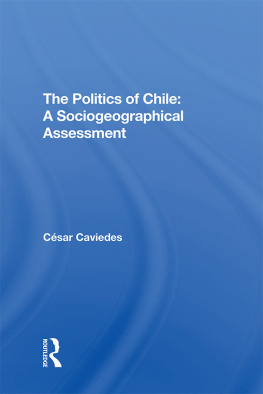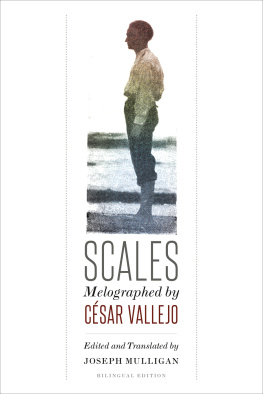The Politics of Chile: A Sociogeographical Assessment
Other Titles in This Series
Brazil: Foreign Relations of a Future World Power, Ronald Schneider
Mexico's Economy: A Political Analysis with Forecasts to 1990, Robert E. Looney
The Future of Brazil, edited by William H. Overholt
Technological Progress in Latin America: The Prospects for Overcoming Dependency, edited by James H, Street and Dilmus D. James
Westview Special Studies on Latin America
The Politics of Chile: A Sociogeographical Assessment Csar Caviedes
Chile's road to socialism, points out the author, was not a linear one. In the last twenty years political parties of an astonishingly wide range of opinions participated in the administration of the country, and their successes and failures have been clearly reflected in the shifting preferences of the voting population. Political ideas did not always receive nationwide acceptance; disobedience, dissent, and confrontation with the government or party officials in Santiago were frequent; and the struggle between centralism and provincial aspirations was a continuing fact of Chilean political life.
Dr. Caviedes focuses clearly on the main protagonists of Chilean politicsthe politicians and the votersand interprets the changing fortunes of the different political parties, both historically and within the context of existing local social, political, and economic conditions. He provides a province-by-province analysis of twenty presidential and congressional elections, demonstrating the variegated character of the voters throughout the country and exploring as well the relevant links with the international political scene.
Csar Caviedes, a native of Valparaiso, Chile, is associate professor of geography at the University of Regina, Saskatchewan. He conducted graduate studies in Italy and the German Federal Republic, and participated in research activities at the University of WisconsinMilwaukee. Dr. Caviedes was one of the founders of the Revista Geogrfica de Valparaso and has worked as a contributing editor of the Handbook of Latin American Studies and of Geospectrum.

Salvador Allende, Baltazar Castro, Jorge Alessandri
Eduardo Frei
Carlos Ibaez del Campo, Eduardo Cruz Coke, Gabriel Gonzalez
Radomiro Tomic, Arturo Alessandri
Carlos Altamirano, J. Antonio Rios, Pedro Aguirre Cerda
Photocollage by A.V. Services, University of Regina
The Politics of Chile: A Sociogeographical Assessment
Csar Caviedes
First published 1979 by Westview Press, Inc.
Published 2019 by Routledge
52 Vanderbilt Avenue, New York, NY 10017
2 Park Square, Milton Park, Abingdon, Oxon OX14 4RN
Routledge is an imprint of the Taylor & Francis Group, an informa business
Copyright 1979 Taylor & Francis
All rights reserved. No part of this book may be reprinted or reproduced or utilised in any form or by any electronic, mechanical, or other means, now known or hereafter invented, including photocopying and recording, or in any information storage or retrieval system, without permission in writing from the publishers.
Notice:
Product or corporate names may be trademarks or registered trademarks, and are used only for identification and explanation without intent to infringe.
Caviedes, Csar.
The politics of Chile.
(Westview special studies in Latin America)
Bibliography: p.
Includes index.
1. ChilePolitics and government1920- 2. ElectionsChile. 3. Social classes
Chile. I. Title.
JL2631.C37 301.5920983 78-23843
ISBN 13: 978-0-367-29507-3 (hbk)
Politics for a Chilean has always been a fact of life. Political decisions at the national or local level have influenced education, affected social and economic status, and shaped personalities. During the period covered by this book, I was born, educated, employed, and enfranchised in this highly politicized country. For me, politics became an ingredient of life that I certainly missed when I first left my native country. But in the view from outside I could observe clearly the highs and lows of the Chilean soul and became aware of the many misguided and often downright false ideas disseminated by so-called experts on Chile.
As a university teacher and a geographer I had enviable opportunities to deal with the intelligentsia as well as with the simple people of the country: the miners of the North, the peasants of Middle Chile, and the shepherds of Magallanes. Prolonged contacts with all of them offered me insight into their aspirations and disenchantments not only in life but also in politics. As I came to know them better, I realized that their political responses were not so much prompted by ideological stimuli as by personal perceptions of their place in society and by the influence of their environment. Politics in Chile should therefore be understood in the sociogeographical context of the protagonists: the voters and the politicians. Along these lines, Doctor Ricardo Cruz Coke produced with great intuition his pioneer work Geografa electoral de Chile in the early 1950s. Recent and significant changes in social relations, electoral procedures, and political conditions have, however, made an updating both desirable and necessary.
Further, the traumatic onslaught on democracy in Chile and the ensuing emotionalism that it caused showed the need for a study on the sociogeographical background of Chilean politics before the numerous mythmakers, both at home and abroad, could embark on a distortion of the past. The 1973 paralysis of the country's political institutions and civic traditions offered the possibility of analyzing Chile's recent past in a fashion that resembles the "instant freeze" technique used in cytological studies. For this reason, the past tense has been used most of the time in the discussion of institutions and processes. I hope that, in the near future, we shall be able to use the present tense again.
In order to offer new insights into Chilean politics, emphasis has been placed on the behavior of social groups and the regional variations of political responses rather than on ideologies. Political and social figures have been directly referred to by name since politics, I believe, is more a product of people than the result of incorporeal doctrines. Moreover, numerous references have been made to the importance of the family name in the career of Chilean politicians.
This book owes its completion to the contribution of several persons. Christiana Donauer-Caviedes, my wife, has worked over the different stages of this study with great dedication and organizational talent. Professor Sam E. Stewart, University of Regina, and Miss Marcia Stewart read the manuscript and made valuable suggestions that I gratefully acknowledge here. The illustrations were drawn by Guillermo Lagos and James G. Ursaki, who sacrificed many well-deserved weekend rest hours.
I have profited very much from my past association and continued friendship with the staff of the Handbook of Latin American Studies, Library of the Congress, Washington, D.C. A great deal of the information contained in this book is derived from the library's bibliographic facilities.













